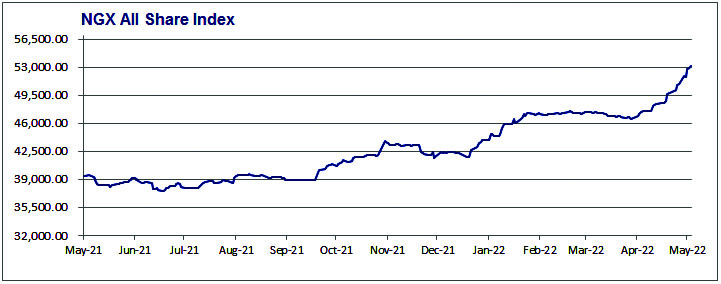
Investors staked about N1.97 trillion on Nigerian equities in the third quarter as stable corporate earnings continue to stimulate investors’ appetite for Nigerian quoted stocks.
Trading data released at the weekend indicated that total transactions for the nine-month period ended Septembe 30, 2022 stood at N1.969 trillion, 47.8 per cent or N637 billion above N1.332 trillion recorded in comparable period of 2021.
The report underlined that while foreign investors had also shown improved appetite for Nigerian stocks, the performance of the domestic market was driven by Nigerian investors. Transactions by domestic investors accounted for 83.70 per cent of total transactions at the Nigerian market in third quarter 2022 compared with 78.43 per cent in third quarter 2021.
The report showed improvements in transactions at the institutional and retail ends of the market. Domestic institutional investors closed deals worth N1.648 trillion in third quarter 2022 as against N1.045 trillion traded in corresponding period of 2021.
Total value of transactions by retail investors also improved from N436.53 billion in third quarter 2021 to N556.78 billion in third quarter 2022.
Nine-month pricing trend analysis had shown that Nigerian equities posted average return of 14.77 per cent, equivalent to net capital gain of about N3.3 trillion for the nine-month period.
The nine-month performance was however moderated by losses recorded in the last three months. Investors lost about N1.50 trillion between July and September 2022 alone as escalated global energy and commodity crises triggered massive portfolio realignments across markets.
Benchmark indices at the Nigerian stock market indicated average negative return of -5.39 per cent for the three-month period ended September 2022, equivalent to net capital depreciation of N1.50 trillion for the three-month period.
The third-quarter performance underlined sustained decline in recent months with investors losing an average of 1.63 per cent or N430 billion in September alone. The market had lost about N28.3 billion in August and suffered its highest loss within the quarter at the onset with a N772 billion loss in July.
The All Share Index (ASI)- the value-based index that tracks all share prices at the Nigerian Exchange (NGX) closed September 2022 at 49,024.16 points as against 51,817.59 points recorded at the beginning of July 2022.
Aggregate market value of all quoted equities dropped from July 2022’s opening value of N27.935 trillion to close September 2022 at N26.451 trillion, a decrease of about N1.50 trillion. The almost perfect correlation between market capitalisation and ASI underlined that the depreciation was mainly due to decline in share prices rather than primary market changes such as reduction in number of shares.
Segmental analysis showed no safe haven for investors during the period. All sectoral indices closed negative, driven by selloffs within the large and mid-cap stocks. The NGX 30 Index- which tracks the 30 largest stocks at the NGX, posted average loss of 7.45 per cent in the third quarter. The NGX Banking Index- the most active index, declined by 4.67 per cent.
Also, the NGX Insurance Index, the most populous index, dropped by 5.46 per cent during the period. The NGX Industrial Goods Index recorded the highest decline of 17.61 per cent within the three-month period. The NGX Oil and Gas Index depreciated by 6.80 per cent in third quarter 2022. The NGX Consumer Goods Index declined by 6.30 per cent. The NGX Pension Index, which tracks stocks in line with the stringent pension funds’ investment guidelines, depreciated by 9.00 per cent while the NGX Lotus Islamic Index- which tracks equities that comply with the more stringent Islamic investment rules, declined by 6.51 per cent in the third quarter.
Analysts attributed the market performance to the worsening domestic and global economic risks characterised by rising inflation and higher interest rates.
Most analysts remained cautious of the outlook in the months ahead citing worsening economic fundamentals and political risks.
Meanwhile, total turnover at the NGX last week stood at 598.817 million shares worth N14.234 billion in 15,859 deals, in contrast with a total of 938.020 million shares valued at N16.701 billion traded in 15,700 deals two weeks ago.
The financial services industry remained atop activity chart with 398.264 million shares valued at N2.219 billion traded in 8,247 deals; thus contributing 66.51 per cent and 15.59 per cent to the total equity turnover volume and value respectively. The conglomerates industry followed with 37.514 million shares worth N49.503 million in 393 deals. The information and communication technology (ICT) industry placed third with a turnover of 30.708 million shares worth N8.383 billion in 1,218 deals.
The three most active stocks were Mutual Benefits Assurance Plc, Sterling Bank Plc and Fidelity Bank Plc, which altogether accounted for 181.347million shares worth N248.920 million in 854 deals, representing 30.28 per cent and 1.75 per cent of the total equity turnover volume and value respectively.
The ASI closed weekend at 43,912.64 points as against the week’s opening index of 44,396.73 points, indicating a drop of 1.09 per cent. . Aggregate market value of all quoted equities also closed weekend down at N23.918 trillion compared with the week’s opening value of N24.182 trillion. The bearish trend depressed the average year-to-date return to 2.80 per cent at the weekend.
Leave a Reply